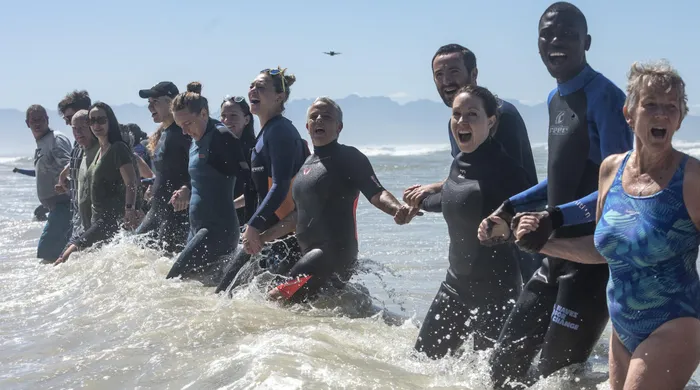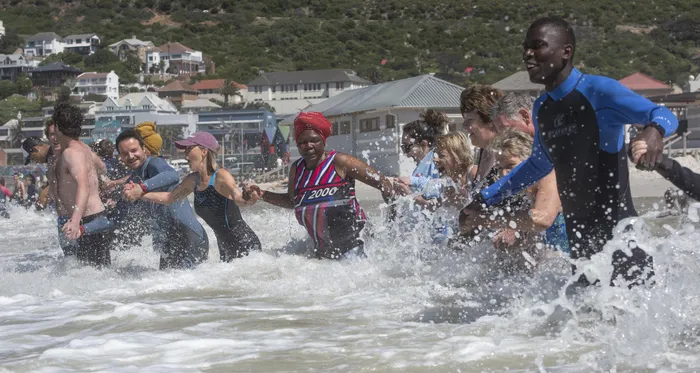
Surf therapy offers children a different lexicon, one born from movement, nature, and community. It empowers them to process their traumas not merely through conversation but through lived experiences.
Image: Supplied
At sunrise, the waves at Muizenberg Beach roll in with familiar rhythm, but for a group of children gathered at the shoreline, each wave carries something far more meaningful than the thrill of surfing.
It carries hope. In a country where nine out of ten young people lack access to mental health support, according to the Children’s Institute at the University of Cape Town (UCT), that hope can be the difference between breaking cycles of trauma or being consumed by them.
Across South Africa’s townships, toxic stress, violence, and poverty have become everyday realities, and for many young people, safe spaces to talk, heal, or even just breathe are rare. That’s where Waves for Change (W4C) comes in.
Through its pioneering Surf Therapy programme, the Cape Town-based NGO is transforming the ocean into an outdoor classroom for emotional resilience, helping children and adolescents manage stress, regulate emotions, and rediscover joy.
Waves for Change began in 2009 with a simple idea: if the ocean brings peace, maybe it can also help people heal.
Now, the group runs surf therapy sessions along South Africa’s coast, reaching over 12,000 young people from stressful communities.
Their latest campaign, “You’re Right on Time”, celebrates World Mental Health Day (October 10) by sharing an important message: adolescence is a second chance for the brain to grow.
UNICEF says the first 1,000 days of life are key for development, but ages 9 to 14 also give kids another opportunity to build emotional health and lifelong coping skills.“We can’t emphasise enough how important this time is,” shares Tony Gubeza, W4C’s Muizenberg site manager.
“Young people growing up in violent environments need access to safe spaces where they can breathe, connect, and build the confidence to shape their futures. That’s what we do every day, we meet them exactly where they are.”

Surf Therapy is more than just surfing. It is a proven mental health approach that mixes surfing with group activities to help improve mental, physical, and social well-being.
Image: Supplied
What does surf therapy really do?
Surf Therapy is more than just surfing. It is a proven mental health approach that mixes surfing with group activities to help improve mental, physical, and social well-being.
In partnership with UCT, the University of the Western Cape, Edinburgh Napier University, and The New School (New York), W4C developed the Take 5 Model, an evidence-based framework that guides every session.
Each surf therapy class integrates energisers, emotional check-ins, paced breathing, self-regulation games, and reflection circles.
Together, these tools teach young people how to manage stress and navigate tough emotions. A 2016 W4C study found that adolescents in violence-exposed communities in Cape Town experienced six to eight traumatic events per year from shootings and drug exposure to physical assault.
Yet, after participating in surf therapy, these same youth reported improved focus, emotional control, and social connection.
When children paddle out into the ocean, they also learn to let go of their fears. When they stand up on a board, they are learning balance not just on water, but in life.
Benefits of surf therapy
The healing power of water isn’t just poetic; it’s physiological. A 2022 study published in the Journal of Outdoor and Adventure Therapy found that surf therapy reduces symptoms of depression, anxiety, and PTSD, while improving self-esteem, confidence and trust.

How waves for change is reshaping mental health for children in South Africa
Image: Ron
Locally, Dr Roxy Davis, a UCT PhD graduate and founder of the Surf Emporium Surf Therapy Programme, has conducted research proving that time spent in the ocean can reshape how participants view themselves and the world around them.
Surfing releases endorphins, lowers stress hormones, and promotes mindfulness. key ingredients for emotional healing.
“The ocean is a great equaliser,” says Davis. “It teaches patience, resilience, and focus, all vital for mental health. Every wave is a fresh start."
Every year on World Mental Health Day, Waves for Change hosts its Immersion Session at Muizenberg Beach. The event begins with a symbolic act: children walking hand in hand into the surf, pausing to ask each other, “Are you okay?”
It’s a question that too often goes unasked and unanswered in communities where silence surrounds trauma. This ritual teaches empathy, trust, and communication. It reminds participants that vulnerability is strength.
The immersion session also marks the start of the NPO's annual fundraising campaign, ensuring that surf therapy remains free and accessible for children in high-stress environments across South Africa.
According to the South African Depression and Anxiety Group (SADAG), one in five South African teens will experience depression before adulthood, yet less than ten percent receive treatment. In many under-resourced communities, the stigma around mental illness remains strong.
Surf therapy offers a different language of movement, nature, and community.
It empowers children to process trauma not through words alone but through experience.“Surfing gives our kids a reason to show up,” says Gubeza. “When they’re in the water, they feel free. They’re not defined by trauma or violence, they’re just kids again, learning how to trust, hope, and dream.”
Because sometimes, therapy doesn’t look like a couch.